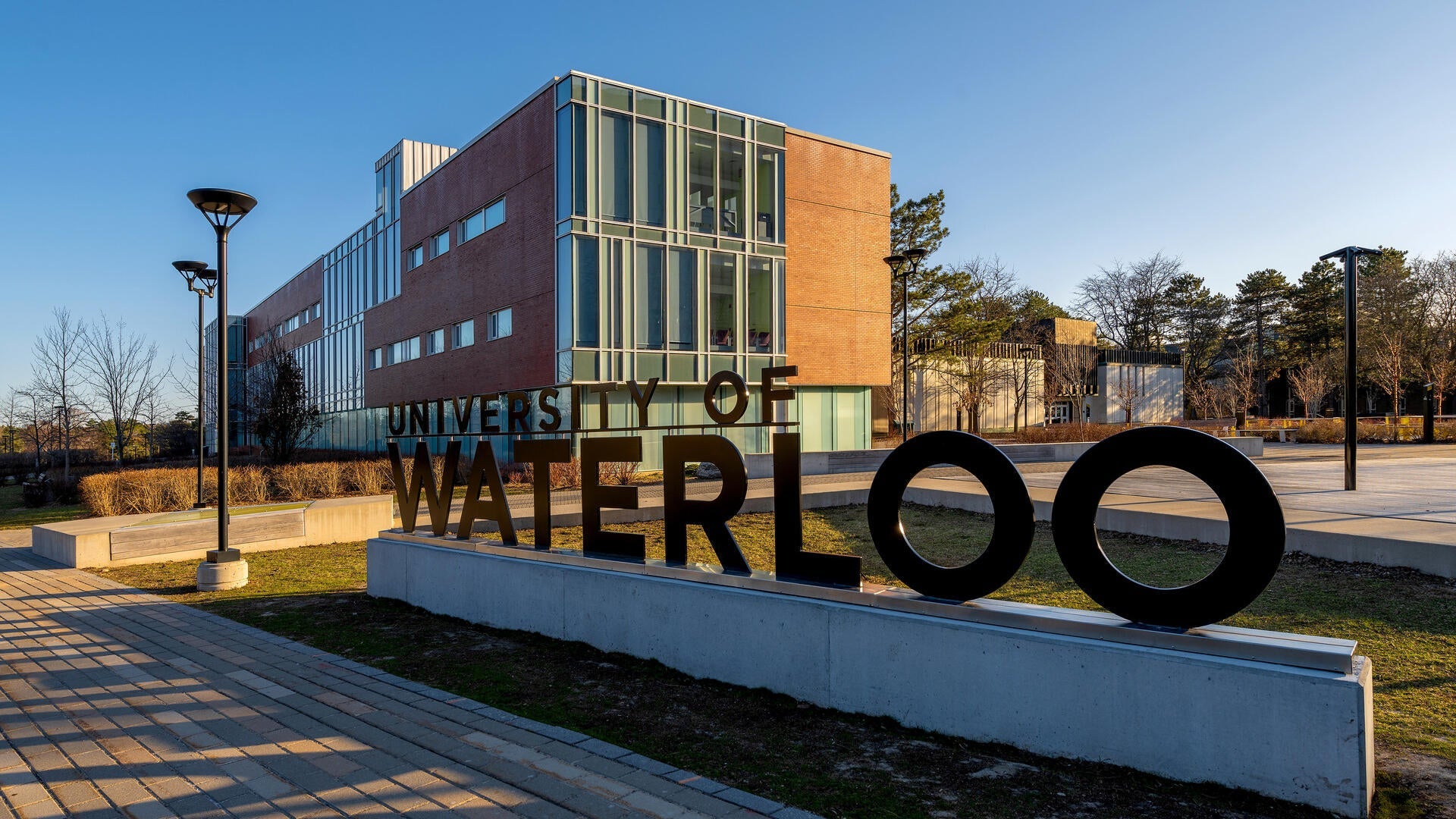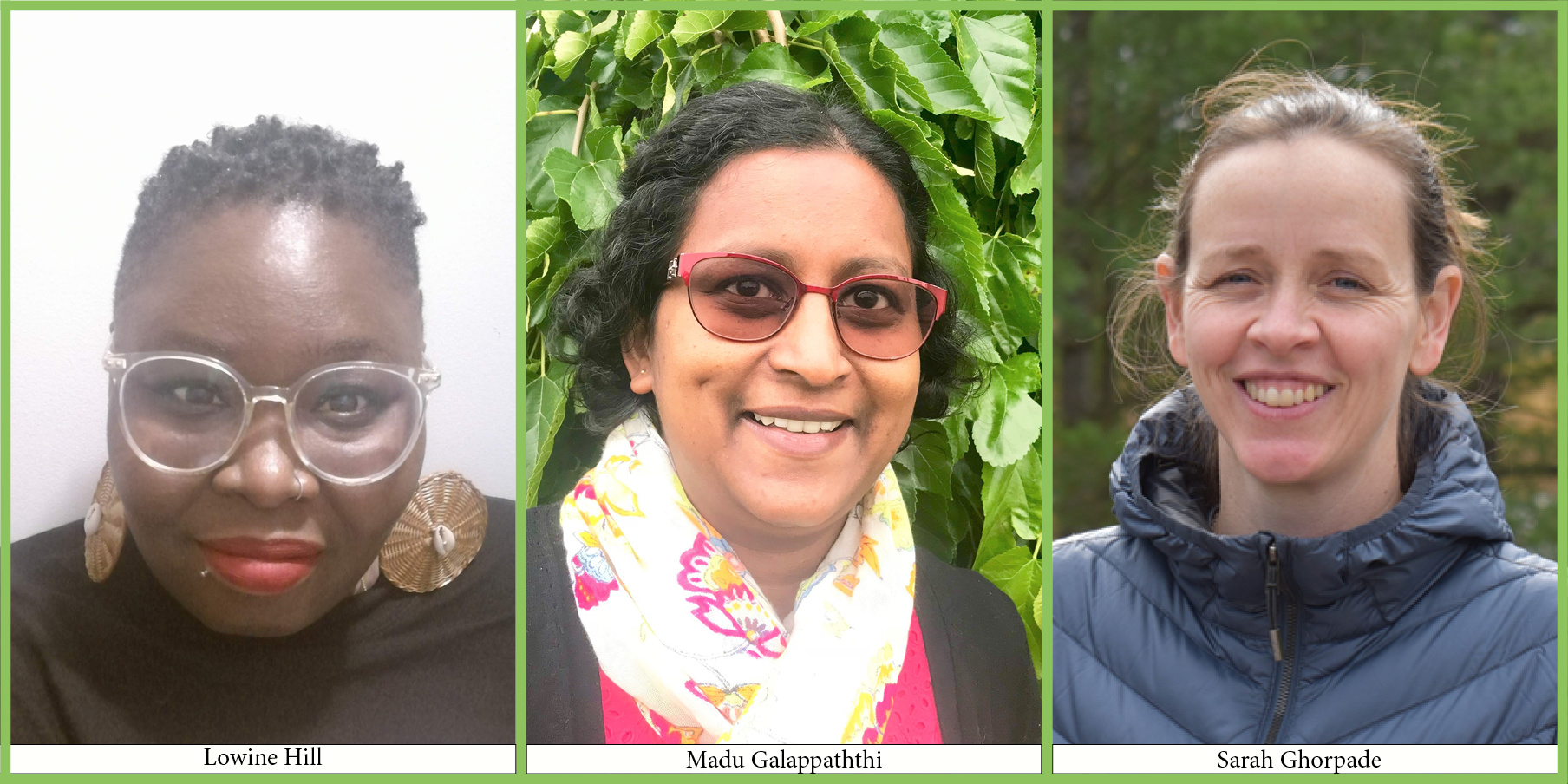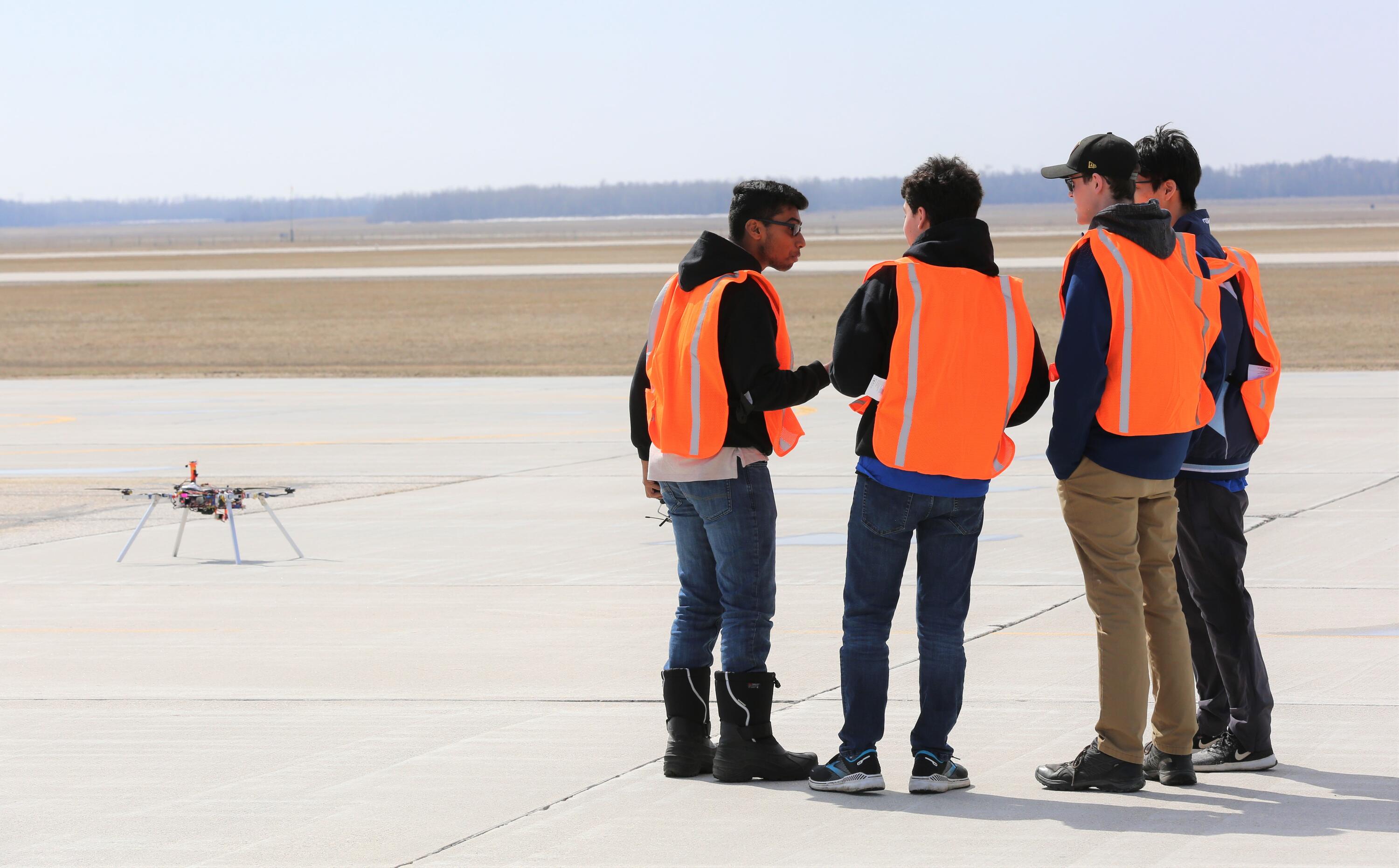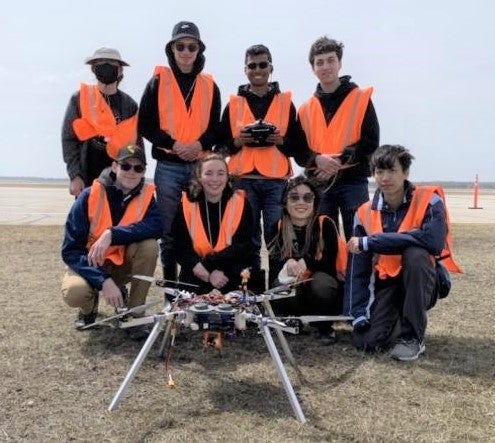Editor:
Brandon Sweet
University Communications
bulletin@uwaterloo.ca
Toronto-Waterloo Region Corridor highlighted in 2022 Startup Genome rankings

By Jon Parsons. This article was originally featured on Waterloo News.
The Toronto-Waterloo Region Corridor has been recognized as one of the world’s premier locations to start a company.
A recently released report ranks the region top in Canada for startups and among the fastest growing in North America.
The ranking lists the University of Waterloo as a key player in the corridor because of its unique entrepreneurial culture and as host to the largest post-secondary co-op program in Canada.
OpenText and eSentire, both University of Waterloo spinoffs, are listed among the main companies contributing to the overall Toronto-Waterloo ecosystem valuation at $46 billion USD.
“Innovation and entrepreneurship have long been drivers for our region, and we are proud of the role our institution has played in preparing and empowering talent and technology,” says Vivek Goel, president and vice-chancellor of the University of Waterloo. “This latest recognition is a reflection of the important work being done by community, private sector and government and industry partners to foster Canada’s high-tech sector.”
The ranking notes that while well-established startup locales in Silicon Valley and New York continue to lead the pack, “North American founders are increasingly choosing to set up outside of established leading ecosystems and are creating new thriving hubs of innovation.”
Startup Genome’s founder and CEO, J.F. Gauthier, offered a glowing review of the Toronto-Waterloo startup ecosystem, specifically highlighting some of the major entrepreneurial incubators in the region.
“Toronto-Waterloo is Canada’s leading startup ecosystem, ranking as number 17 globally due to an impressive growth of 128 per cent,” Gauthier says. In 2021, a record $7.7 billion went to startups in Toronto and Waterloo.
One key to the region’s ongoing success as a hub for innovation is its multiculturalism, which the report notes is driven by Canada’s social-democratic values, in turn attracting talent from around the world.
As a hotbed for talent, the region has seen a flourishing of new companies working in AI, cybersecurity, fintech, healthtech and sustainability.
Startup Genome’s 2022 Global Startup Ecosystem Report compares some of the world’s major innovation regions, including Silicon Valley, New York, London and other major entrepreneurial ecosystems.
The report is the world’s most comprehensive and widely-read research on startups, with nearly 300 innovation ecosystems and more than three million companies included in the analysis.
The top 20 in the rankings are:
#1 - Silicon Valley
#2 (tie) - New York City
#2 (tie) - London
#4 - Boston
#5 - Beijing
#6 - Los Angeles
#7 - Tel Aviv
#8 - Shanghai
#9 - Seattle
#10 - Seoul
#11 - Washington DC
#12 - Tokyo
#13 - San Diego
#14 - Amsterdam-Delta
#15 - Paris
#16 - Berlin
#17 - Toronto-Waterloo
#18 - Singapore
#19 - Chicago
#20 - Sydney
Environment's first eLearning course developed by grad students for grad students

This article was originally published on the Faculty of Environment's news site.
In the Winter 2022 term, the Faculty of Environment offered an e-Learning Graduate-level Course on Decolonizing Methodologies for Sustainability Research. The course was designed and delivered by School of Environment, Resources and Sustainability (SERS) PhD students Lowine Hill and Madu Galappaththi, and former School of Planning PhD student Sarah Ghorpade.
The eLearning course was part of an initiative the three have led since Spring 2021, beginning with a Workshop Series offered to Grad students, followed by a speakers series co-organized with the Faculty in the Fall term.
The result of these two activities culminated in the eLearning course, which they saw as a way to embed the materials and continue the conversation, while addressing a pertinent gap in graduate training in relation to research methodologies.
Remarkably, the inaugural offering of the eLearning Course (non-credit) was designed to help students at any stage of their research to examine the meaning of decolonization with respect to themselves and their research. Participants were guided through a three-step approach, beginning with reflections on each student’s own power and positionality as researchers; then exploring decolonization of the research process more broadly. Finally, they applied this knowledge to their own research, including through bringing other voices and epistemologies into the centre of the research process. Action planning was also a central element of this course.
The course was intended in part to help students develop an understanding of decolonization in the context of sustainability research. "We hear the term "decolonization" a lot - but its meaning can be fuzzy,” said Ghorpade. “One of our aims was to help participants develop an understanding of what it means to them, what it means with respect to sustainability as a discipline, and then to start thinking about ways to take action on it within their graduate research and beyond."
"The need to embed learning about decolonisation and sustainability research through a course was a suggestion that came out strongly during the Speakers Series,” said Hill. “The material resonated with graduate students and faculty alike and addressed a gap.”
The five-week course included five learning modules, two synchronous sessions, and interactive discussion board activities. Each module included a blend of presentations, readings, and video recordings from leading scholars in this space from within Canada and beyond. This included Waterloo’s own professor Janice Barry (School of Planning), professor Deborah McGregor from York University, and Linda Tuhiwai Smith, professor from Te Whare Wānanga o Awanuiārangi, New Zealand.
A total of 14 students participated in the course, comprising Masters and PhD students from across the Faculty of Environment. The course was well received, with many students noting that the course provoked reflections on aspects of their education and research approach that they had not explicitly examined before.
"The course helped me recognize and address some of my own biases and assumptions with respect to how I approach and reference research. It also encouraged me to broaden my perspectives, and integrate different knowledge traditions into my research,” said Alexandra Ho, Master of Climate Change student.
The instructors hope the participants left the course with a better understanding of what decolonization means to them and feel equipped to take tangible steps to addressing it in their own research.
“We do acknowledge that there are realities of graduate student programs, like milestones and timelines, which can limit the extent to which certain strategies can be implemented. But we are hopeful that the learnings of the course will contribute to a shift in mindset about research that will stay with participants throughout their career,” said Galappaththi.
Hill, Galappaththi, and Ghorpade are grateful for the enthusiasm and contributions of the grad community as well as the support they received from the faculty’s staff, faculty members and leadership, particularly Faculty of Environment Dean, Jean Andrey. The trio said, “Dean Jean has been the wind in our sails throughout!”
The trio is encouraged by the impact they have had so far and are looking forward to continuing this conversation with the incoming Faculty leadership.
Read the full story to view the speaker series videos
Virtue helps people rise above despair and resentment, says research

New research reveals that devotion to selfless values can help people feel more confident and less hostile in stressful circumstances.
In two experiments, participants focused on their own selfless values, with most related to benefiting others. This action caused brain activity and feelings linked to personal power, which made the participants less hostile toward disliked people and worldviews.
“Selfless values can be like life vests that buoy a kind of higher power and resilience, freeing us from worry and defensiveness,” said Ian McGregor, professor of personality and social psychology at the University of Waterloo and the study’s lead author. “Focusing on a greater good beyond themselves had the paradoxical effect of making participants’ psychologically stronger and more reasonable.”
In both experiments the authors first reminded all participants about stressful topics—such as relationship problems and moral violations—that have typically made participants upset and defensively hostile in past research. They then gave the participants a few minutes to describe how their life goals reflected their highest values. In one of the experiments, 197 participants wore electroencephalographic (EEG) headsets that measured patterns of brain activity related to power and enthusiasm. In the second experiment, 490 participants rated how determined and enthusiastic they felt.
Focusing on selfless values in their lives heightened the EEG and feeling measures of personal power, which in turn reduced harsh judgments. Importantly, these effects occurred only among participants who also reported being persistently engaged in the pursuit of purpose and meaning in their lives.
“These results help makes sense of why and for whom devotion to selfless values can sustain tenacious resolve, even in seemingly hopeless circumstances,” McGregor said.
These results build on previous research by McGregor and collaborators showing that devotion to virtue predicts wise reasoning and respect for others’ perspectives in conflicts. They also complement another line of their researchshowing that hate between groups can activate the same motivational system to bolster feelings of personal power and meaning in life.
“Together, the present and previous research suggests that devotion to virtue may be an under-appreciated antidote to hostility and hate in the real world. Virtue and hate are alternative levers for activating personal power and meaning in life. If you have one, you feel less need for the other,” McGregor said.
The new study appears in the Journal of Experimental Social Psychology.
Students reflect on lessons learned at UAV competition

Members of student team WARG (Waterloo Aerial Robotics Team) confer while competing at an event in Manitoba.
This article was originally published on the Faculty of Engineering's news site.
Members of a University of Waterloo student team with a strong engineering contingent didn’t snag any hardware, but they still came home with valuable lessons from a recent competition for unmanned aerial vehicles.
The Waterloo Aerial Robotics Group (WARG) was one of seven university teams from across Canada to put their entries to the test at the 13th Unmanned Systems Canada Student UAS Competition in Southport, Manitoba in May.

In only their second year of participation, members of the 90-student team were pleased to successfully complete both competition tasks – one involving the disposal of a hazardous package and the other detecting intruders within a designated perimeter.
“We came here to learn and to collect data, and we did just that,” said Sahil Kale, the team’s technical director and pilot. “I’m proud of us for getting in the air both days.”
Lessons learned ranged from the importance of having clear areas of responsibility to reduce confusing communication among team members, to having more spare parts on hand to handle inevitable repairs.
WARG, which draws more than three-quarters of its members from engineering programs, had the only unmanned vehicle system in the competition that was developed entirely in-house. Over half of members are in their first or second years of study.
“Whether we succeed or fail in competition, the goal is to ensure that students leave the team with technical skills and memorable experiences that they take with them after graduation,” said Jenny Luo, the team’s business lead.
Members on the contest team, dubbed Project Vanguard, were Sahil Kale, Jenny Luo, Ryan Dullaert, Aidan Bowers, Matt Visser, Brielle Chenier, Anthony Luo and Daniel Puratich.
The competition is meant to promote and develop Canadian expertise and experience in unmanned aerial systems technologies.
Link of the day
When and Where to get support
Students can visit the Student Success Office online for supports including academic development, international student resources, immigration consulting, leadership development, exchange and study abroad, and opportunities to get involved.
Instructors looking for targeted support for developing online components for blended learning courses, transitioning remote to fully online courses, revising current online courses, and more please visit Agile Development | Centre for Extended Learning | University of Waterloo (uwaterloo.ca).
Instructors can visit the Keep Learning website to get support on adapting their teaching and learning plans for an online environment.
Course templates are available within your course in LEARN to help you build and edit your content and assignment pages quickly.
The following workshops, webinars, and events are offered by the KL team (CTE, CEL, ITMS, LIB):
-
Scholarship of Teaching and Learning (SoTL) Methods – self-directed, continuous self-enrollment course in LEARN.
-
Independent Blended Course Design (iBlend) - self-directed, continuous self-enrollment course in LEARN.
-
Copyright Overview for Waterloo Instructors and Staff - self-directed, continuous self-enrollment course in LEARN.
-
Independent Remote Course Design Essentials (iReCoDE) - self-directed, continuous self-enrollment course in LEARN.
-
Supporting Student Mental Health (for Instructors) – self-directed, continuous self-enrollment course in LEARN.
-
WAI Inspired Wednesdays: Enabling the uptake of feedback (CTE7010) – July 13, 10:00 a.m. to 12:00 noon
-
SoTL Stories – July 13, 1:00 p.m. to 2:00 p.m.
-
WAI Inspired Wednesdays: Redesigning Assignments from a Remote Offering to a Flipped Course (CTE7010) – July 20, 10:00 a.m. to 12:00 noon.
Supports are available for employees returning to campus. Visit IST’s Hybrid Work and Technology guidelines and workplace protocols to assist with the transition.
The Writing and Communication Centre has in-person and virtual services to support grad and undergrad students, postdocs and faculty with any writing or communication project. Services include one-to-one appointments, drop-ins at Dana Porter Library, online workshops, writing groups, English conversation practice, and custom in-class workshops.
Co-op students can get help finding a job and find supports to successfully work remotely, develop new skills, access wellness and career information, and contact a co-op or career advisor.
The Centre for Career Action (CCA) has services and programs to support undergrads, grad students, postdocs, alumni, and employees in figuring out what they value, what they’re good at, and how to access meaningful work, co-op, volunteer, or graduate/professional school opportunities. Questions about CCA's services? Live chat, call 519-888-4047, or stop by our front desk in the Tatham Centre 8:30 a.m. to 4:30 p.m., Monday to Friday.
Drop-in to Warrior Virtual Study Halls on Wednesdays from 5:30 p.m. to 7:00 p.m. Come together in this virtual space to set goals and work independently or in groups each week.
Renison's English Language Institute continues to offer virtual events and workshops to help students practice their English language skills.
If you feel overwhelmed or anxious and need to talk to somebody, please contact the University’s Campus Wellness services, either Health Services or Counselling Services. You can also contact the University's Centre for Mental Health Research and Treatment. Good2Talk is a post-secondary student helpline available to all students.
The Library is open with expanded hours for access to book stacks, drop-in individual study space, bookable group study rooms, drop-in access to computers and printers, book pick-up services and IST Help Desk support. Librarian consultations, Special Collections & Archives and the Geospatial Centre are available by appointment. Full details on current services and hours are available on the Library’s COVID-19 Update webpage.
The Faculty Association of the University of Waterloo (FAUW) continues to advocate for its members. Check out the FAUW blog for more information.
The University of Waterloo Staff Association (UWSA) continues to advocate for its members. Check out the UWSA blog for more information.
The Sexual Violence Prevention and Response Office (SVPRO) supports all members of the University of Waterloo campus community who have experienced, or been impacted, by sexual violence. This includes all students, staff, faculty and visitors on the main campus, the satellite campuses, and at the affiliated and federated Waterloo Institutes and Colleges. For support, email: svpro@uwaterloo.ca or visit the SVPRO website.
The Office of Indigenous Relations is a central hub that provides guidance, support, and resources to all Indigenous and non-Indigenous campus community members and oversees the University's Indigenization strategy.
The Waterloo Indigenous Student Centre, based at St. Paul’s University College, provides support and resources for Indigenous students, and educational outreach programs for the broader community, including lectures, and events.
WUSA supports for students:
Peer support - MATES, Glow Centre, RAISE, Women’s Centre - Visit https://wusa.ca/services/wusa-peer-support to book an appointment either in person or online for the Fall term.
Food Support Service food hampers are currently available from the Turnkey Desk 24/7 in the Student Life Centre. Drop off locations are also open again in SLC, DC, DP, SCH and all residences.
Co-op Connection all available online. Check https://wusa.ca for more details.
Centre for Academic Policy Support - CAPS is here to assist Waterloo undergraduates throughout their experience in navigating academic policy in the instances of filing petitions, grievances and appeals. Please contact them at caps@wusa.ca. More information is available.
WUSA Student Legal Protection Program - Seeking legal counsel can be intimidating, especially if it’s your first time facing a legal issue. The legal assistance helpline provides quick access to legal advice in any area of law, including criminal. Just call 1-833-202-4571.
Empower Me is a confidential mental health and wellness service that connects students with qualified counsellors 24/7. They can be reached at 1-833-628-5589.
GSA-UW supports for graduate students:
The Graduate Student Association (GSA-UW) supports students’ academic and social experience and promotes their well-being.
Advising and Support - The GSA advises graduate students experiencing challenges and can help with navigating university policies & filing a grievance, appeal, or petition.
Mental Health covered by the Health Plan - The GSA Health Plan now has an 80 per cent coverage rate (up to $800/year) for Mental Health Practitioners. Your plan includes coverage for psychologists, registered social workers, psychotherapists, and clinical counselors.
Dental Care - The GSA Dental Plan covers 60 to 70 per cent of your dental costs and by visiting dental professionals who are members of the Studentcare Networks, you can receive an additional 20 to 30 per cent coverage.
Student Legal Protection Program - Your GSA fees give you access to unlimited legal advice, accessible via a toll-free helpline: +1-833-202-4571. This advice covers topics including housing disputes, employment disputes, and disputes with an academic institution.
The Graduate House: Open Monday to Tuesday 11:30 a.m. to 7:00 p.m. and Wednesday to Friday 11:30 a.m. to 9:00 p.m. We’re open to all students, faculty, staff, and community members. The Graduate House is a community space run by the GSA-UW. We’re adding new items to the menu. Graduate students who paid their fees can get discounts and free coffee.
When and Where (but mostly when)
Warriors vs. Laurier Blood Donation Battle. Join our “Waterloo Warriors” team on the Blood.ca website or app. #ItsInYouToGive
Warriors Custom Apparel Program, June 22 – July 13. Purchase customized team specific gear to get ready for the 2022-2023 season. Hoodies, Hats, Jerseys, T-shirts and more. Buy now.
Warriors Youth Summer Day Camps, July 4 to September 2. Open to boys and girls age 5-18. Baseball, Basketball, Football, Hockey, Multi-Sport and Games & Volleyball. Register today.
WISE Workshop, “Introduction to Feedback-Based Optimization and Applications to Energy Systems” by Daniel Eduardo Olivares Quero, Monday, July 11, 9:00 a.m. to 4:00 p.m., In-person at Evolv1 Classroom.
NEW - WaterTalk: The Ontario lake-river routing product, presented by Bryan Tolson, Tuesday, July 12, 1:00 p.m., EIT 1015.
Visiting Professor Catherine Le Visage presents “Forgoing animal experiments: a case study in intervertebral disc regenerative medicine”, Thursday July 14, 3:30 p.m. to 4:30 p.m., E6-2024. Light refreshments provided. Please register here.
Concept $5K Finals, Thursday, July 14.
NEW - WaterTalk: Atmospheric moisture tracking, presented by Poornima Unnikrishnan, Tuesday, July 19, 10:00 a.m., EIT 1015.
Master of Taxation Virtual Information Session, Tuesday, July 19, 5:30 p.m.